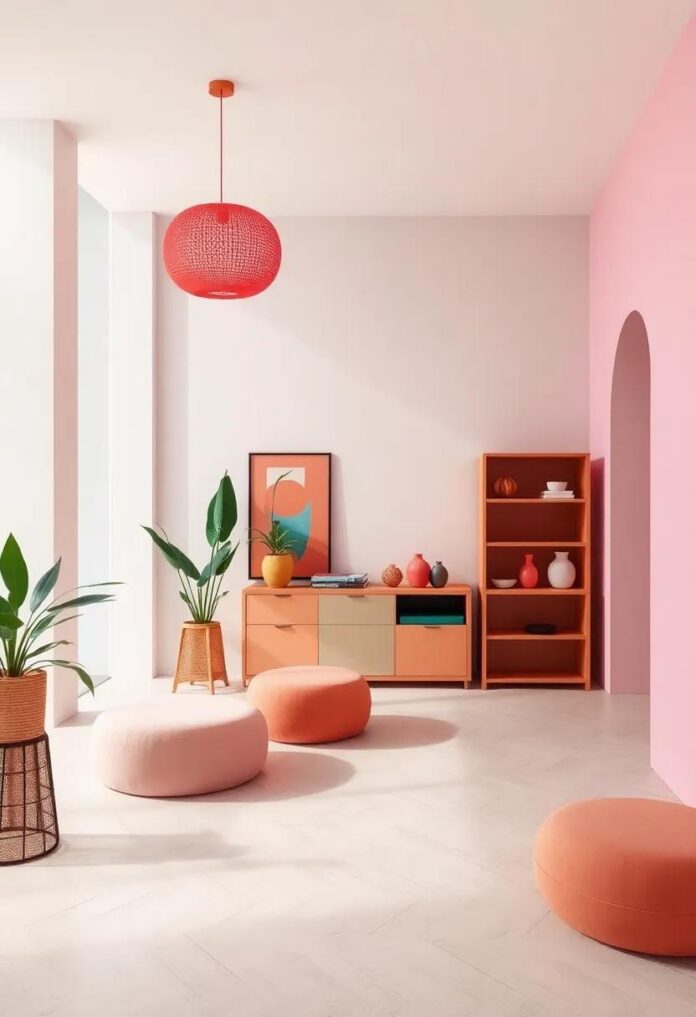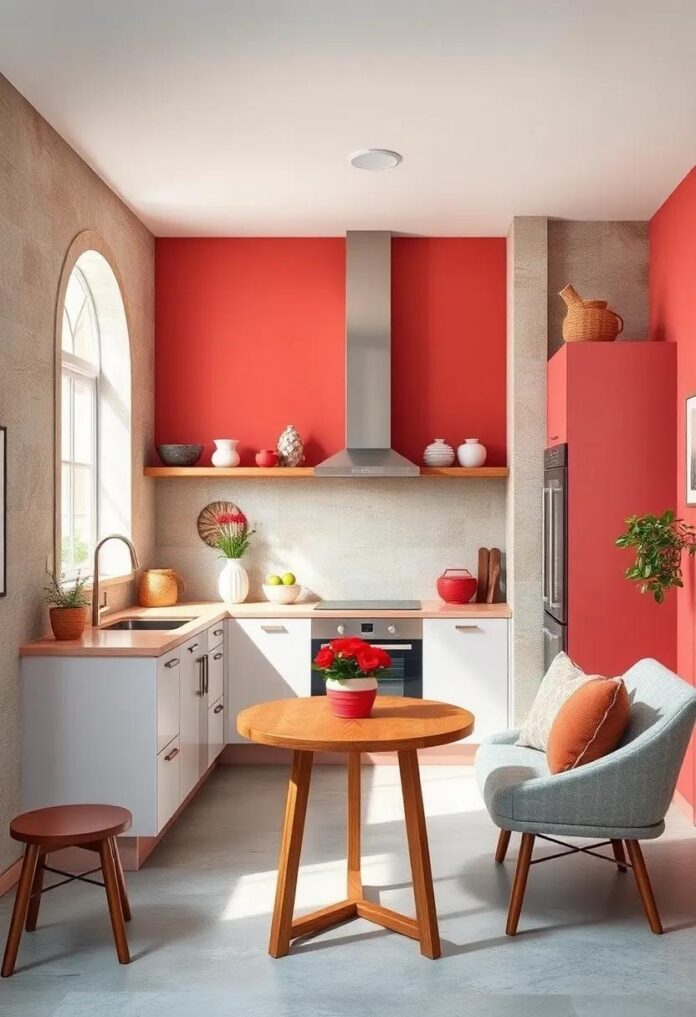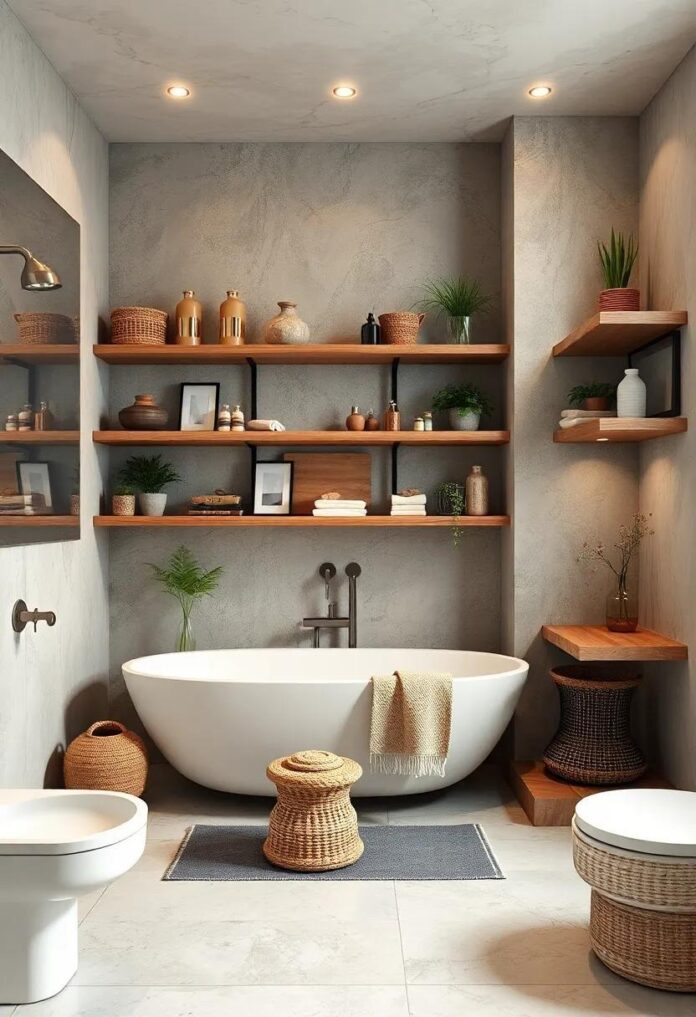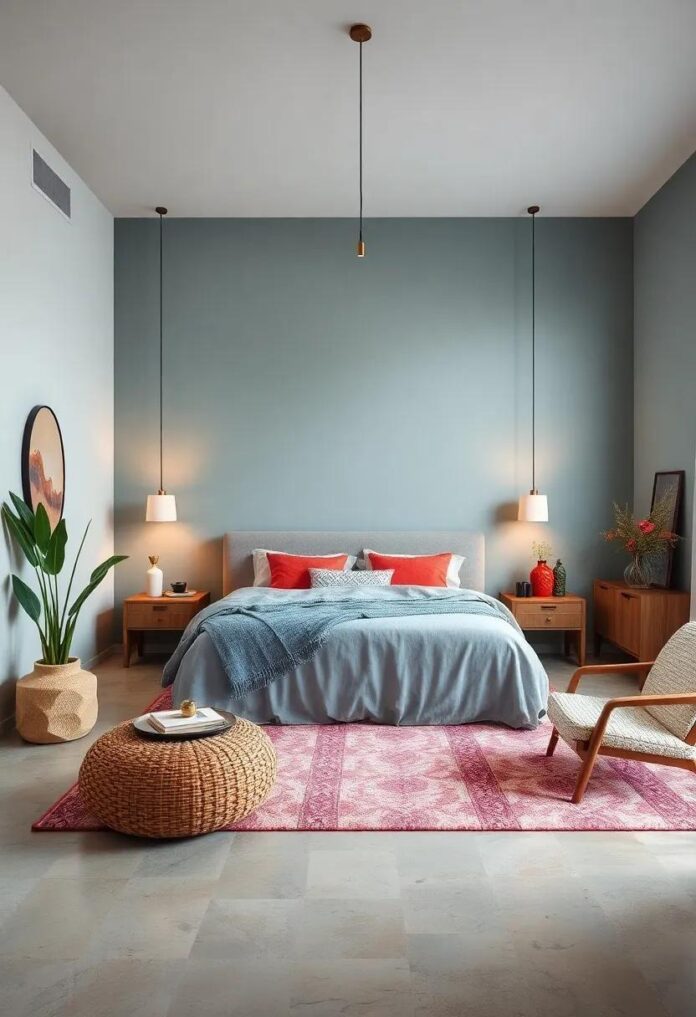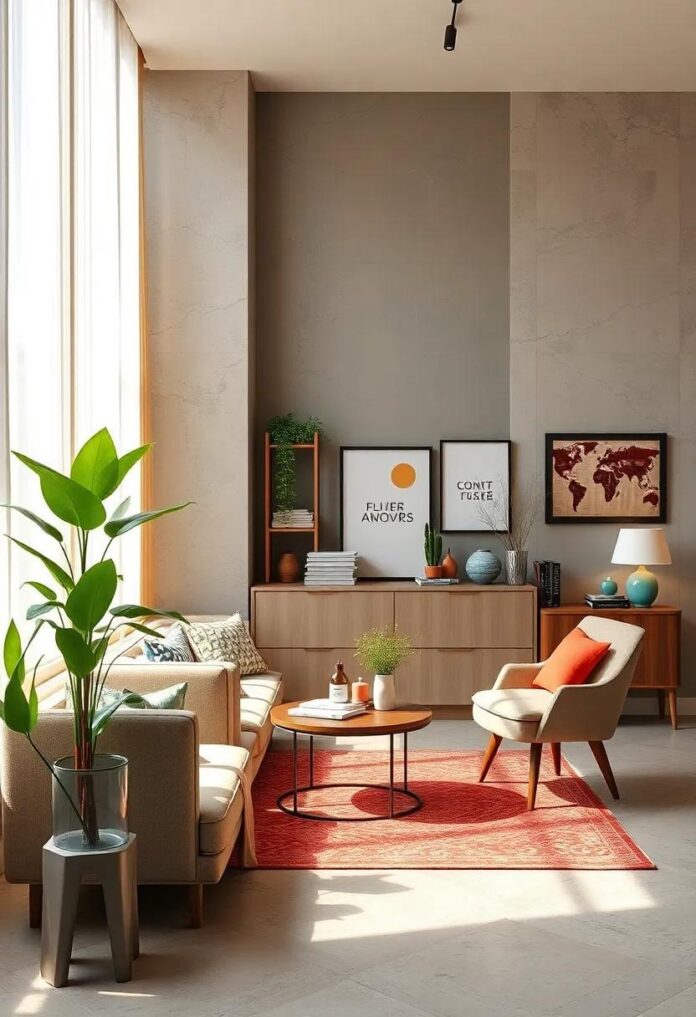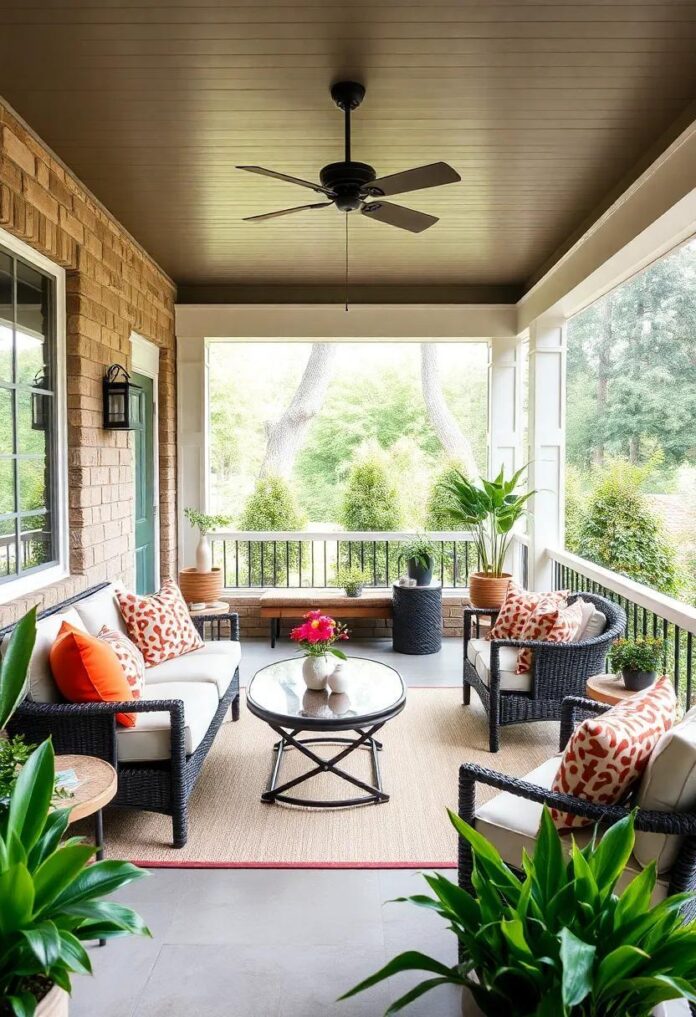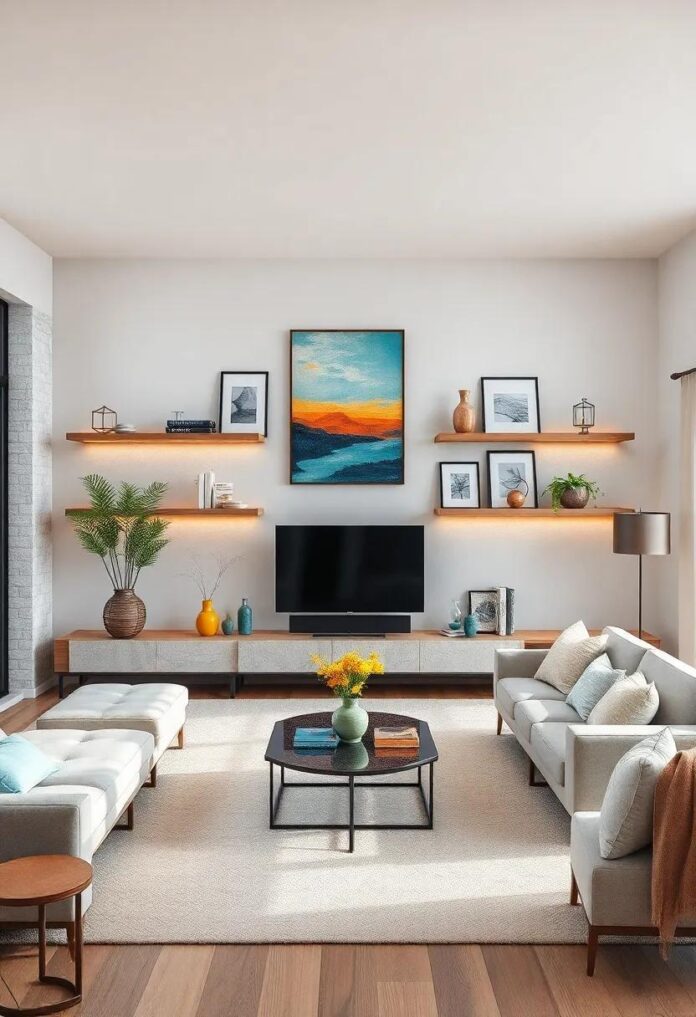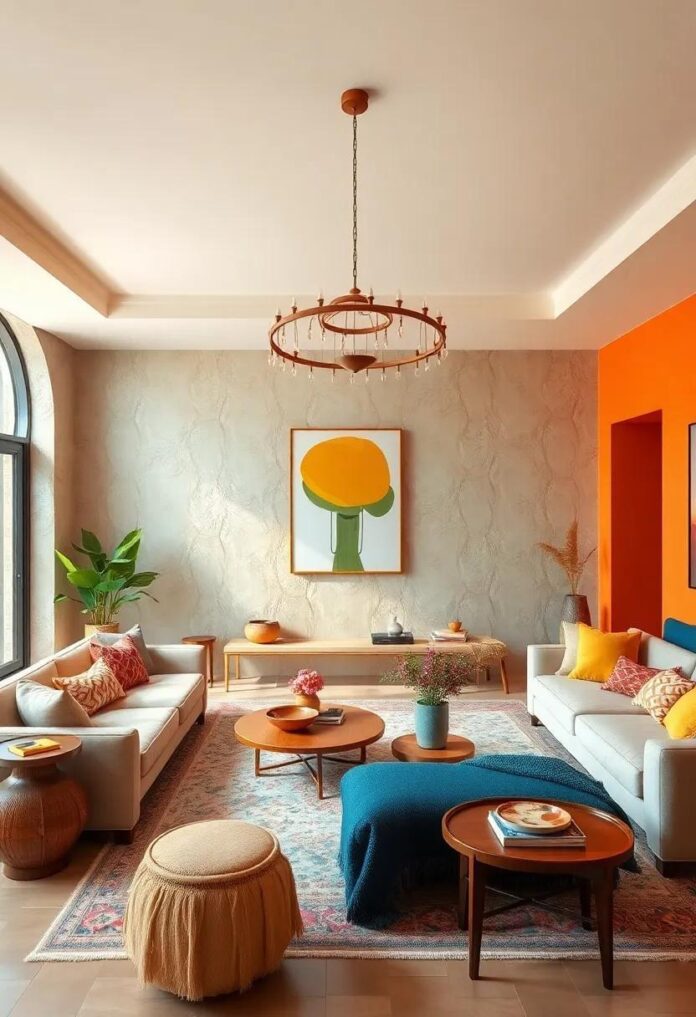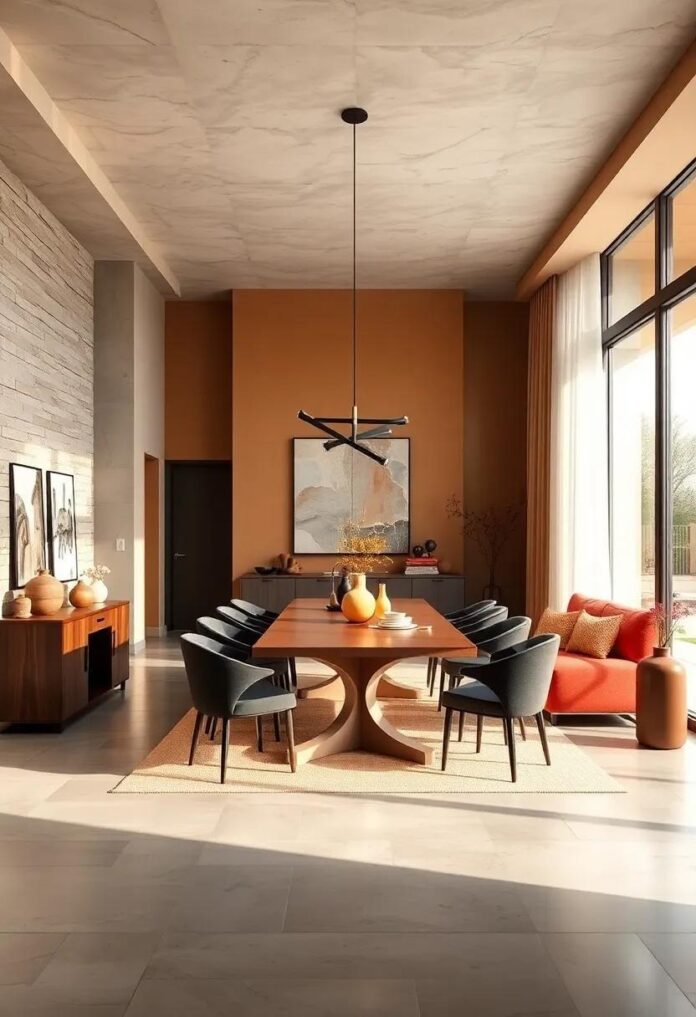In a world increasingly defined by its intricate tapestry of cultures, perspectives, and aesthetics, the realm of interior design has blossomed into a vibrant celebration of diversity. No longer constrained by minimalist conventions or monochromatic palettes, modern design enthusiasts are turning to maximalism—a bold, expressive approach that invites an array of colors, textures, and styles to coexist in harmony. This article explores the captivating art of eclectic designs infused with a maximalist flair, revealing how the fusion of varied influences can create spaces that not only tell a story but also reflect the unique identities of their inhabitants. Join us as we delve into the principles and inspirations behind this dynamic design movement, uncovering ways to embrace diversity through the artful layering of elements that make our homes as multifaceted as the lives we lead.
Exploring the Rich Tapestry of Cultures Through Eclectic Design Choices
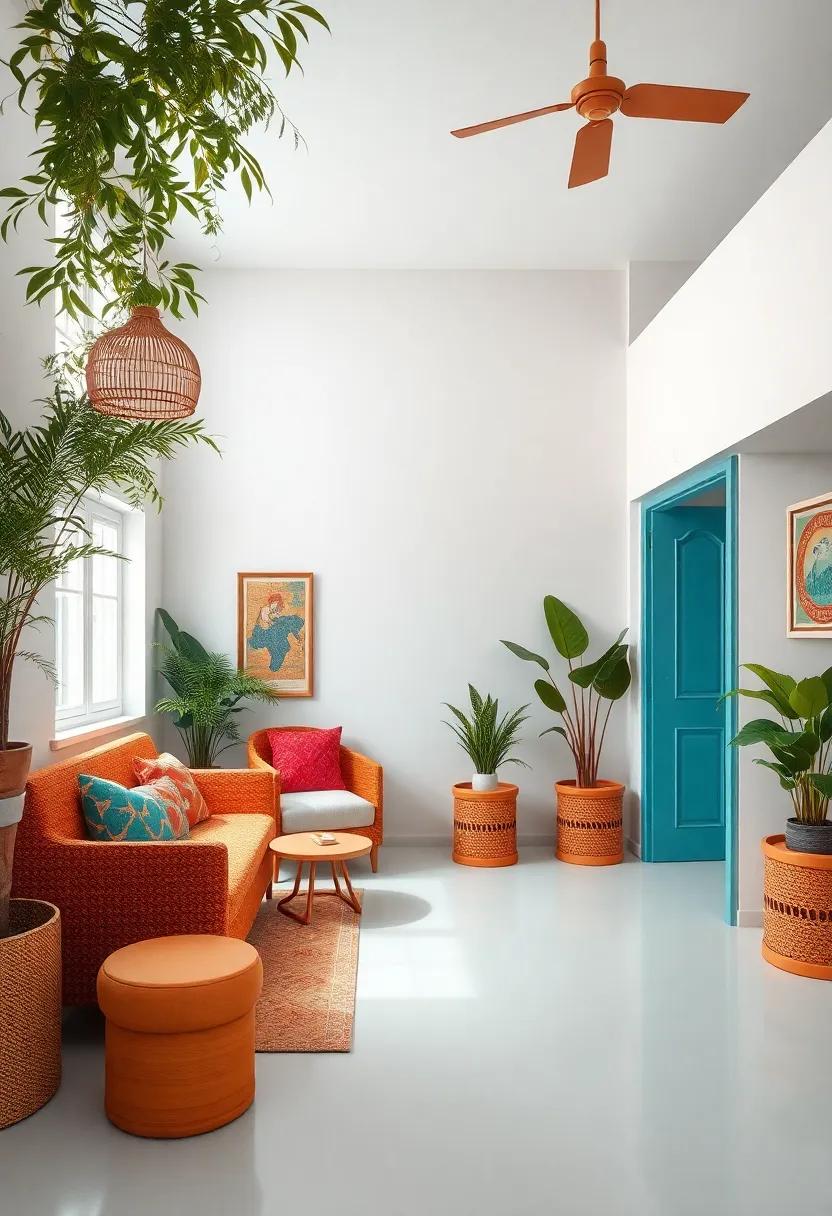
Eclectic design thrives on the vibrant interplay of contrasting elements, reflecting a spectrum of cultures that enrich our living spaces. By blending colors, textures, and styles from around the world, we create a mosaic that tells a story—one where conventional craftsmanship meets modern aesthetics. This cultural dialog can be showcased through:
- Textiles: Incorporating handwoven fabrics from indigenous communities alongside contemporary prints.
- Artwork: Displaying a mix of local and global pieces, from tribal masks to modern murals.
- Furniture: Combining vintage finds with sleek, minimalist designs, creating a unique balance.
The allure of eclectic design lies in its ability to transform our surroundings into an immersive experience. Each element serves as a portal to different cultures, invoking memories and dreams. Consider the dynamics of incorporating global influences in your space through:
| Element | Cultural Influence | Design Tips |
|---|---|---|
| Rugs | Persian | Layer with modern furniture for contrast. |
| Wall Art | Mexican | Mix with monochrome frames to enhance vibrancy. |
| Lighting | Moroccan | Use in clusters for dramatic effect. |
The Vibrancy of Color: Bold Hues That Celebrate Diversity in Interiors
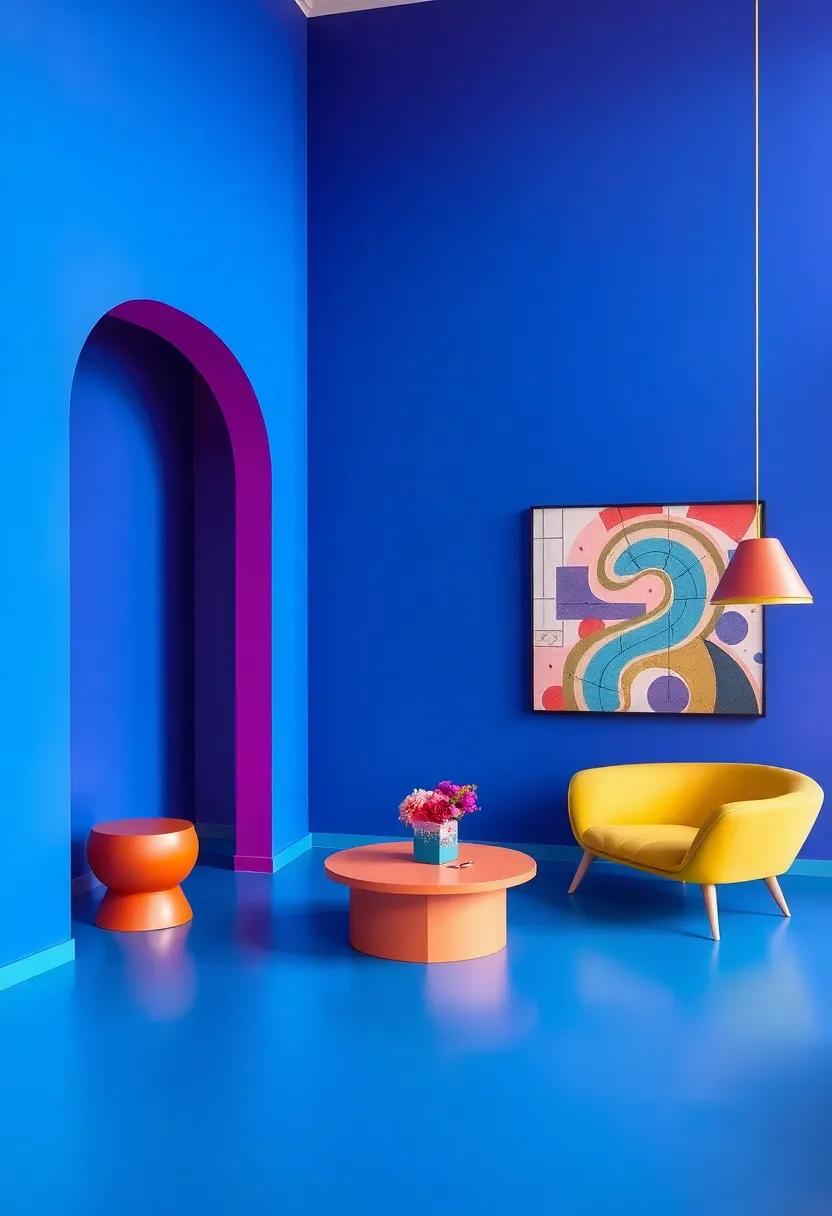
In the world of interior design,bold colors are more then just a whim; they are an expression of identity and culture. When combined in eclectic spaces, these hues create a lively tapestry that tells a story and invites interaction.Embracing deep emerald greens alongside vivid fuchsia or warm ochres can transform a room from mundane to unusual. Each color strategically placed can evoke emotions and spark conversations, making every corner of your space a tribute to diversity. Here are some vibrant choices to consider:
- Cobalt Blue: Represents calmness and depth.
- Sunset Orange: Brings warmth and liveliness.
- Fuchsia Pink: Adds a playful touch of whimsy.
- Aqua Teal: Infuses a refreshing energy.
Maximalist design thrives on the ideology that “more is more,” and colors play a pivotal role in this aesthetic. Layering patterns and mixing textiles can enhance the vibrancy of your interior. When examining how colors interact, consider their impact on light and space. A thoughtfully crafted color palette not only draws the eye but also uplifts the spirit of those who inhabit the space. Below is a simple guide to harmonizing colors:
| Color | Effect | Best Pairing |
|---|---|---|
| Bright Yellow | Stimulates positivity | Purple or Navy |
| Rich Scarlet | Inspires energy | Soft grays or Creams |
| Vibrant Green | Promotes tranquility | Earthy Browns or Terracotta |
Textures That Tell a Story: The Role of Fabric in maximalist Spaces
In the vibrant world of maximalist design, fabric takes on a multifaceted role that transcends mere function. Textiles are more than just decorative elements; they are storytelling devices that weave narratives of culture,history,and personal experiences into the fabric of a room. from the sumptuous feel of tactile velvet to the intricate patterns of hand-woven tapestries, each texture can evoke emotion and memory, creating a space where one can truly live and breathe diversity. The eclectic mix not only invites the eye to wander but also encourages touch, transforming a home into an immersive tapestry of experiences.
When curating fabrics in a maximalist setting,consider the following elements that contribute to the overall aesthetic:
- Layering: Blend various textures such as knitted throws,embroidered cushions,and printed drapes to create depth.
- Contrast: Use bold patterns and hues alongside softer, more muted fabrics to strike a visually pleasing balance.
- Cultural Influence: Incorporate textiles from different parts of the world, like Moroccan poufs or Indian block prints, to enrich the narrative.
To illustrate the impact of fabric in creating a coherent story within a maximalist space, consider the table below, which highlights key fabric types and their unique storytelling attributes:
| Fabric Type | Story Element |
|---|---|
| Chinoiserie | explores Eastern influence through intricate designs. |
| Linen | Brings a rustic touch and nostalgia of serene countryside living. |
| Satin | Imparts luxury and sophistication, echoing ancient opulence. |
Mixing Patterns: The Dance of Designs in a Diverse Aesthetic
In a world where minimalism often dominates design conversations, the art of blending various patterns offers a refreshing departure from the norm.The key to this bold endeavor lies in understanding the fundamental principles of balance and harmony. By combining florals, stripes, and geometric shapes, one can create a vibrant tableau that tells a unique story. Each pattern plays its own role, contributing to a multidimensional experience that invigorates any space or ensemble. To achieve coherence amidst chaos,consider layering elements that share a common color palette or texture,allowing your eclectic mix to breathe and flourish.
To optimize your pattern mixing adventure, here are some essential tips to elevate your design game:
- Establish a focal point: Choose one dominant pattern to anchor the design.
- Vary the scale: Mix large patterns with small ones to avoid overwhelming the senses.
- Use negative space: Allow breathing room between patterns for a more curated effect.
| Pattern Type | Best Pairing |
|---|---|
| Floral | Stripes |
| Polka Dots | Geometric |
| Chevron | solid Colors |
Artistic Freedom: How Unique Artwork Elevates Eclectic Interiors
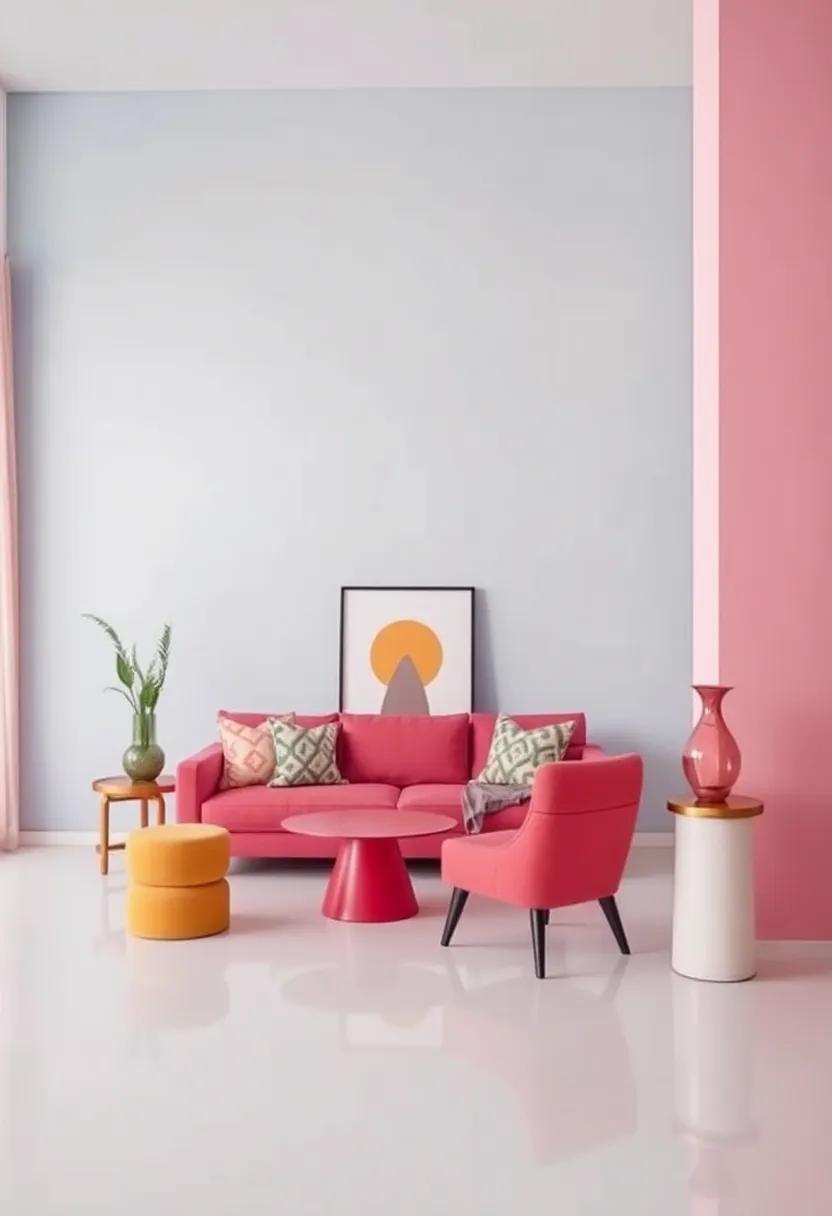
The beauty of eclectic interiors lies in their ability to marry contrasts,and unique artwork plays a pivotal role in this pursuit. When various styles and colors harmonize, they create a rich tapestry of expression that captivates the eye and stimulates the creativity. In such spaces, artwork that defies convention enhances the overall aesthetic, drawing visitors into a world of intrigue and inspiration.Consider incorporating pieces that showcase:
- Bold colors to energize a neutral backdrop
- Mixed mediums for a tactile experience
- Cultural artifacts that tell a story
- Abstract forms that challenge perception
Embracing these elements fosters a dialogue between different artistic expressions, inviting a sensory exploration of art in daily life. Each piece becomes a conversation starter, weaving together the cultural and personal narratives that define the space. To illustrate the interplay of diverse artworks, visualize a curated arrangement incorporating:
| Artwork Type | Emotional Response |
|---|---|
| Abstract Painting | Provokes thought and curiosity |
| Vintage Poster | Nostalgia and warmth |
| Handcrafted Sculpture | Invites tactile engagement |
| Modern Photography | Inspires contemporary reflection |
Cultural Influences: Integrating Global Elements into Your Space
infusing your space with elements from various cultures can create a rich tapestry of design that speaks to your individuality and appreciation for global diversity. Consider incorporating textiles, art, and decorative items from different corners of the world. Each piece can tell a story and evoke memories or aspirations, allowing you to travel through your décor. A South American tapestry draped over a Scandinavian chair, or African tribal patterns mingling with Japanese ceramics, invites intrigue and conversation. When selecting these items, think about their origins, and the narratives they bring; this not only enhances aesthetics but fosters a deeper connection to global traditions.
To curate a maximalist setting,aim for a harmonious balance that still feels cohesive. Use color, texture, and pattern to create visual interest while avoiding chaos. Here are some tips for a balanced design approach:
- Layer Textures: Combine smooth, coarse, and plush materials to create depth.
- Sculptural Elements: Integrate vibrant sculptures from various cultures as focal points.
- Color Palette: Choose a unifying color scheme that allows for cultural contrasts but maintains a sense of harmony.
- Personal Artifacts: Include items collected during travels that resonate with personal stories or memories.
| Element | Cultural Origin |
|---|---|
| Jute Wall Hangings | India |
| Japanese Origami Lamps | Japan |
| Moroccan Poufs | Morocco |
| Mexican Talavera Tiles | Mexico |
Embracing Imperfection: the Beauty of Wabi-sabi in Maximalism
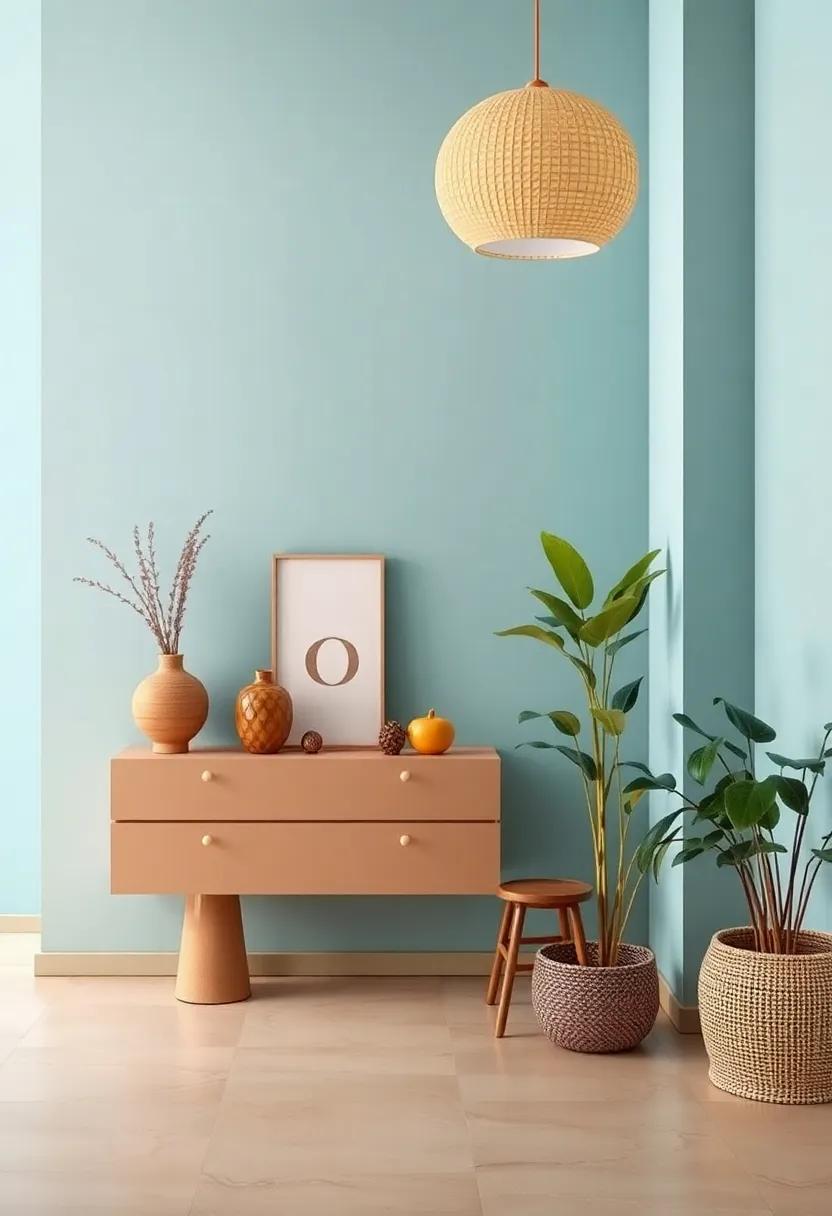
In the art of maximalism, the celebration of exuberance frequently enough intertwines with the philosophy of wabi-sabi, which embraces the beauty found in imperfection and transience. This approach encourages us to appreciate the unique character that imperfections bring to our spaces, allowing for a rich tapestry of textures, colors, and shapes. By integrating elements that showcase a sense of history or a story,we not only highlight the charm of these items but also create a visual narrative that adds depth and warmth to our environments. Consider these elements that can embrace the notion of imperfection:
- Antique Finds: Vintage pieces that may bear the scars of time.
- Handcrafted Items: Objects that showcase the unique touch of the artisan.
- Layered Textures: Combining soft fabrics with raw, unrefined materials.
in a maximalist setting, this philosophy allows for a harmonious contrast between abundance and restraint. Rather than seeking perfection, we are invited to admire the organic qualities of various pieces as they coexist in a space filled with juxtaposition. The delicacies of color and form can be beautifully showcased in curated arrangements that reflect personal style and heritage. A thoughtfully designed space might utilize:
| Element | Description |
|---|---|
| Vases | Unique shapes and glazes showcasing their handcrafted nature. |
| Textiles | Fabrics with irregular patterns that tell a story. |
| Wall Art | pieces that celebrate asymmetry and raw finishes. |
Layers of Meaning: Symbolism in Decor and Its Cultural Significance
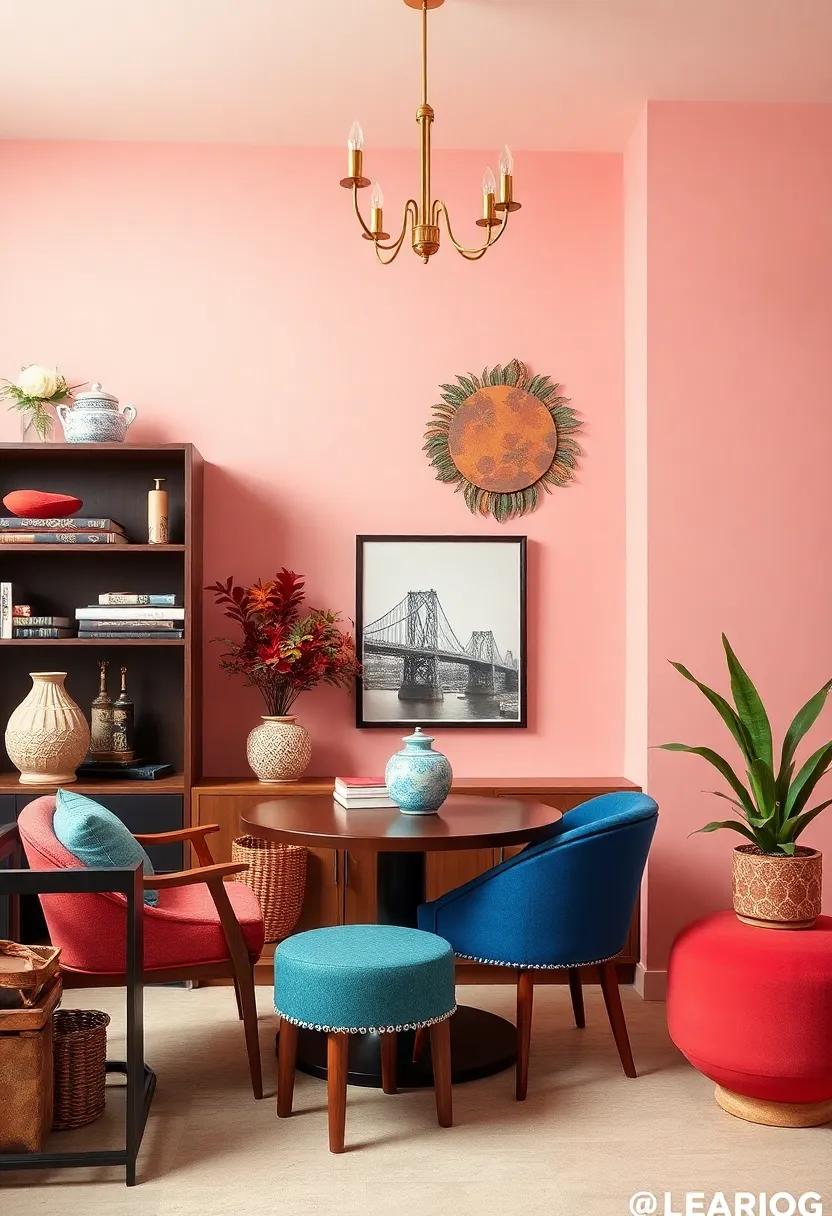
In the kaleidoscopic world of eclectic design, every piece of decor tells a story, rich with symbolism and steeped in cultural significance. This captivating approach encourages a harmonious coexistence of styles, where traditional African carvings can find their place beside Japanese ceramics. Such unexpected pairings not only enrich the aesthetic but also serve as a conversation starter, allowing individuals to explore the deeper meanings behind each object. Elements like colors, patterns, and materials contribute to a narrative that reflects personal histories, cultural heritage, and global influences, encouraging an appreciation for diversity.
Consider the following symbols commonly found in eclectic decor:
- Patterns: Intricate designs can symbolize cultural narratives or rituals.
- Colors: Each hue carries its own meaning, representing emotions or states of being across cultures.
- Materials: Natural fibers may symbolize sustainability, while metals can reflect industrial advancement.
- Shapes: Geometric forms can denote order and stability, while organic shapes may embody fluidity and growth.
the integration of these elements not only beautifies a space but also fosters a deeper connection between the occupants and their habitat.By embracing various cultural symbols, maximalist decor invites an exploration of identity, heritage, and shared stories, allowing us to appreciate the multitude of perspectives that shape our world.
Nature’s Palette: Bringing the Outdoors In Through Diverse Plant Selections
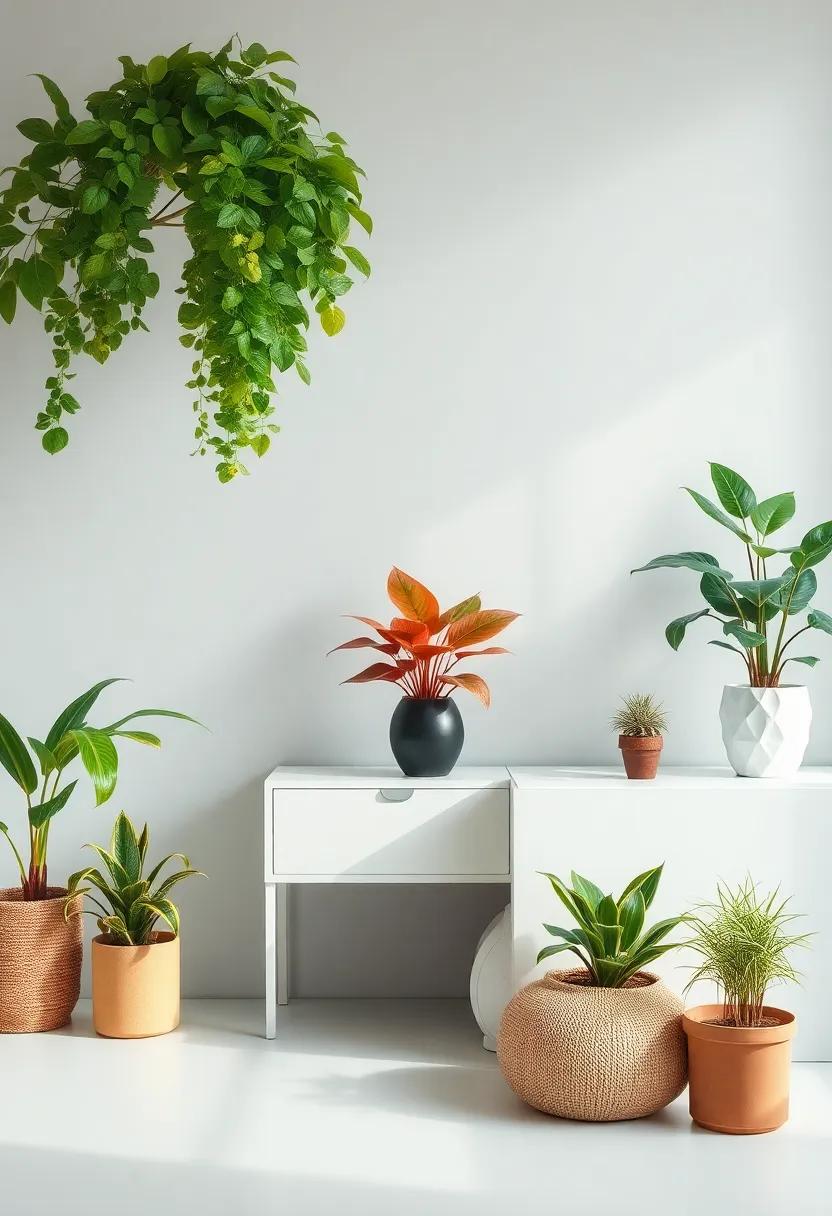
Infusing your living space with a variety of plants not only enhances aesthetics but also creates a soothing atmosphere reminiscent of the great outdoors. By selecting an eclectic mix of flora, you can cultivate a vibrant tapestry that captures unique textures, colors, and patterns. Some key plant selections to consider include:
- Foliage Faves: Monstera Deliciosa, Snake Plant
- Blooming Beauties: African Violet, Peace Lily
- Succulent Wonders: echeveria, String of Pearls
- Airy Greens: Spanish Moss, Tillandsia
Bringing these plants into your home not only enlivens the decor but also allows you to play with varying heights, shapes, and greenery densities.By layering plants of different sizes, from towering palms to petite succulents, you can create depth and interest in any room.to further inspire your botanical journey, here’s a table showcasing some fantastic plant pairings that complement each othre beautifully:
| Plant Type | Best Companion | light preference |
|---|---|---|
| Fiddle Leaf Fig | Rubber Plant | Bright Indirect Light |
| Pothos | Chinese Evergreen | low to Medium Light |
| ZZ Plant | Cast Iron Plant | Low to Bright Indirect light |
Historical Inspirations: Infusing Vintage Styles with Modern Eclecticism
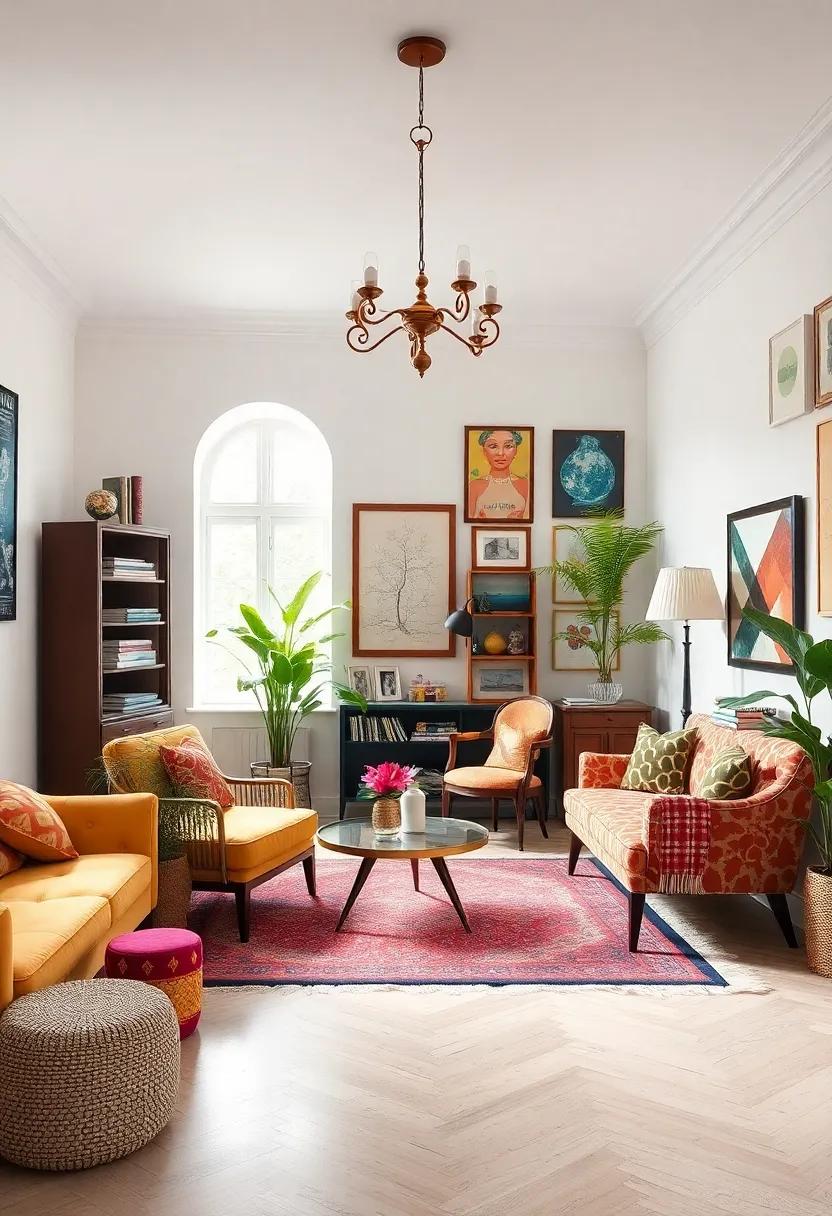
Drawing from a rich tapestry of past eras, modern designers are breathing new life into vintage styles, creating a unique blend that champions both nostalgia and innovation.this eclectic approach often melds the ornate details of the Baroque period with the clean lines of mid-century modern,allowing for the contrasting aesthetics to coexist harmoniously. Some key aspects include:
- color Palettes: Deep jewel tones paired with muted pastels to evoke a sense of warmth and depth.
- Furnishing Styles: Mixing antique furniture with contemporary pieces to create an inviting and layered environment.
- Textural Variations: Combining materials such as velvet, wood, and metal to achieve a sense of tactile richness.
Historical inspirations also pave the way for playful juxtapositions that redefine dining and lounging spaces. Such as, an art deco table can be a stunning centerpiece when surrounded by modern minimalist chairs, creating a conversation starter that breaks conventional design boundaries. Consider the following influences that seamlessly integrate past and present:
| Design Element | Historical Influence | Modern Twist |
|---|---|---|
| Textiles | victorian floral patterns | Geometric prints on contemporary cushions |
| Lighting | Art nouveau chandeliers | Sleek LED fixtures with vintage aesthetics |
| Wall Decor | Baroque gilded mirrors | Abstract art to balance the ornate |
Combining Styles: The Harmony of Modern and Traditional Elements
In the art of design, merging the contemporary with the classic unlocks a treasure trove of possibilities that breathe new life into living spaces. The effectiveness of this fusion lies in the careful selection of elements that harmonize rather than clash. Consider integrating bold patterns and rich textures alongside traditional fixtures; vintage light fixtures can hang luminously above modern dining tables, creating a conversation piece that invites awe and admiration. Incorporating handcrafted artisanal items while showcasing sleek, modernist furniture generates a captivating dialogue between eras, allowing each piece to elevate the other’s beauty.
Achieving this equilibrium requires an innate understanding of balance and contrast. A well-curated collection may include:
- Furniture: A Victorian armchair paired with a minimalist coffee table.
- Art: Abstract contemporary art alongside classical sculptures.
- Textiles: Modern geometric cushions on a traditional Persian rug.
To support your design journey, maintaining a flexible palette is essential. Below is a simple table illustrating the potential color balance for this eclectic approach:
| Color Palette | Modern Shades | Traditional Hues |
|---|---|---|
| Neutral Base | Soft Grays | Warm Cream |
| Accent Colors | Vibrant Emerald | Deep Burgundy |
| Highlight Tones | crisp White | Rich gold |
A Journey Through Time: Retrofuturism Meets Cultural Eclecticism
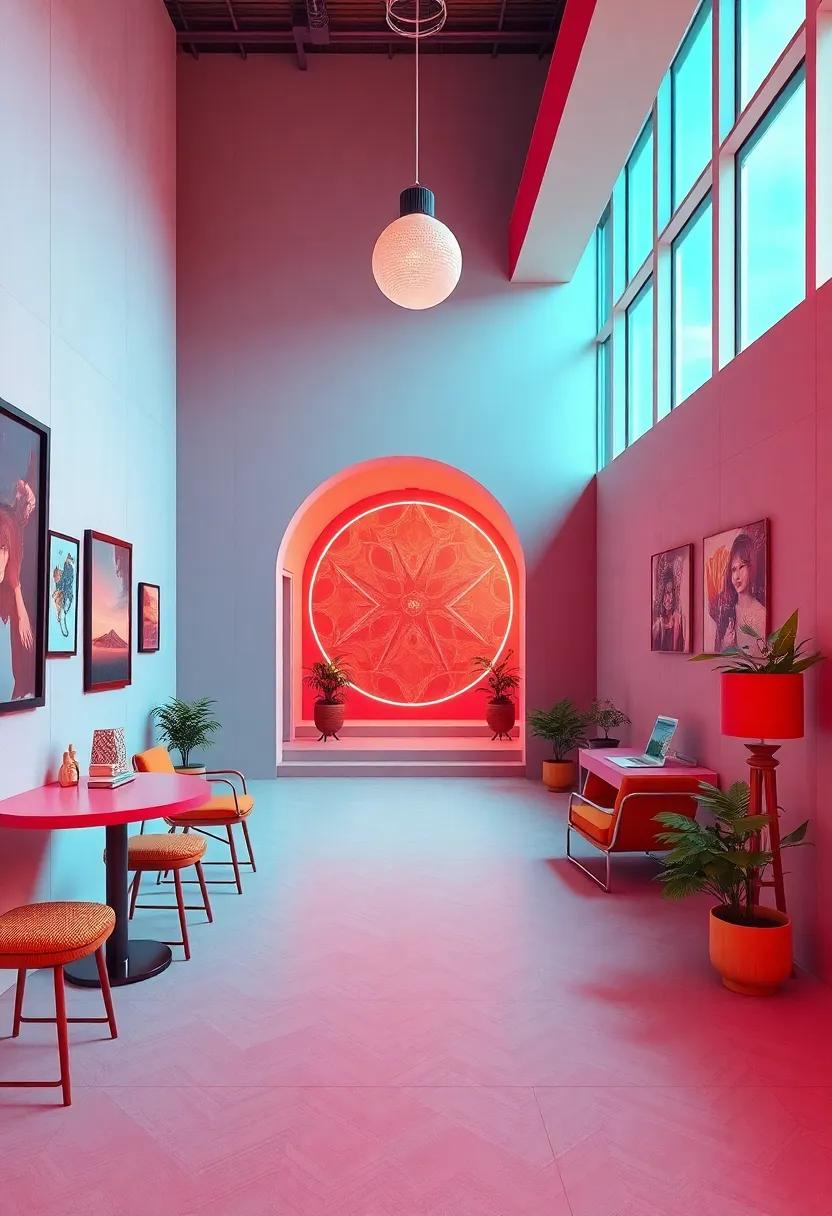
Retrofuturism, with its nostalgic gaze into the future as envisioned through past decades, forms a unique backdrop for the vibrant tapestry of modern eclectic design. This aesthetic movement thrives on a delightful amalgamation of styles that evokes the charm of yesteryear while simultaneously innovating new expressions. Imagine stepping into a space adorned with vintage diner booths, paired with art deco lighting, and accented by mid-century modern artwork. In such a space, chaos becomes harmony, where the essence of time-honored artistry breathes life into contemporary experiences. The jarring juxtaposition of different eras invites curiosity, encouraging one to explore the unexpected dialogue between past and present.
Moreover, cultural eclecticism plays a pivotal role in crafting such eclectic designs, as it thrives on the rich tapestry of global influences. By merging traditional textiles with futuristic elements and handcrafted pieces, designers can create spaces that not only reflect diverse aesthetics but also celebrate heritage and individuality. Consider the inclusion of Japanese shoji screens alongside Mexican folk art, or African patterns interwoven with Scandinavian minimalism. This blend enhances the narrative of each piece, fostering a sense of unity amidst diversity. A well-curated environment encourages an appreciation for global narratives while highlighting the beauty in differences, bridging cultures in a spectacular conversation through bold design choices.
| Design Element | Cultural Influence | Era |
|---|---|---|
| Bohemian patterns | Middle Eastern | Contemporary |
| Art Deco Accents | Western | 1920s |
| Wabi-Sabi Objects | Japanese | Ancient |
| Tribal Textiles | African | Traditional |
Personal Narratives: Storytelling Through Curated Design Collections
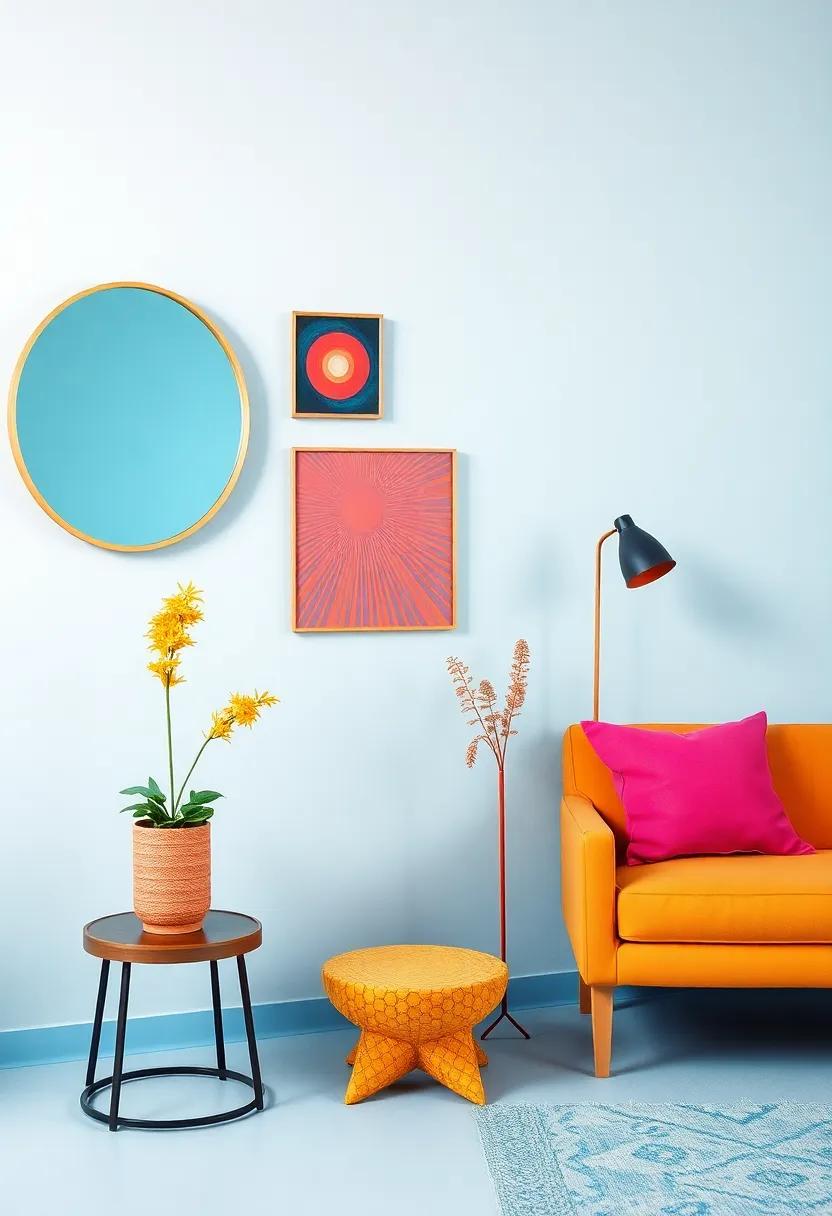
Personal narratives breathe life into curated design collections, weaving stories through objects, colors, and textures that reflect individual journeys. In a world saturated with minimalism, the art of eclectic designs offers a refreshing counterpoint, celebrating diversity and maximalist flair. Every piece becomes a chapter in an ongoing tale, inviting viewers to explore the profound connections between culture, tradition, and personal expression. Elements such as bold patterns,vibrant color palettes,and layered textures marry to create environments that tell unique stories,transforming mere spaces into rich narratives that resonate.
The essence of storytelling is further accentuated through the careful curation of each design element. Consider the following components that can be entwined to manifest a compelling visual journey:
- Cultural artifacts: Items sourced from different cultures that evoke memories and experiences.
- Unexpected color combinations: Juxtaposing hues that spark intrigue and conversation.
- Textural contrasts: Mixing materials like wood, metal, and fabrics to enhance tactile narratives.
This approach not only encourages personal reflection but also fosters connections with others who share similar stories or appreciate the beauty in diversity. The curation of such elements creates a dialogue between the observer and the collection, emphasizing the idea that every object is a vessel for memory and expression.
Innovative Furniture Choices: Bold Statements in Eclectic Spaces
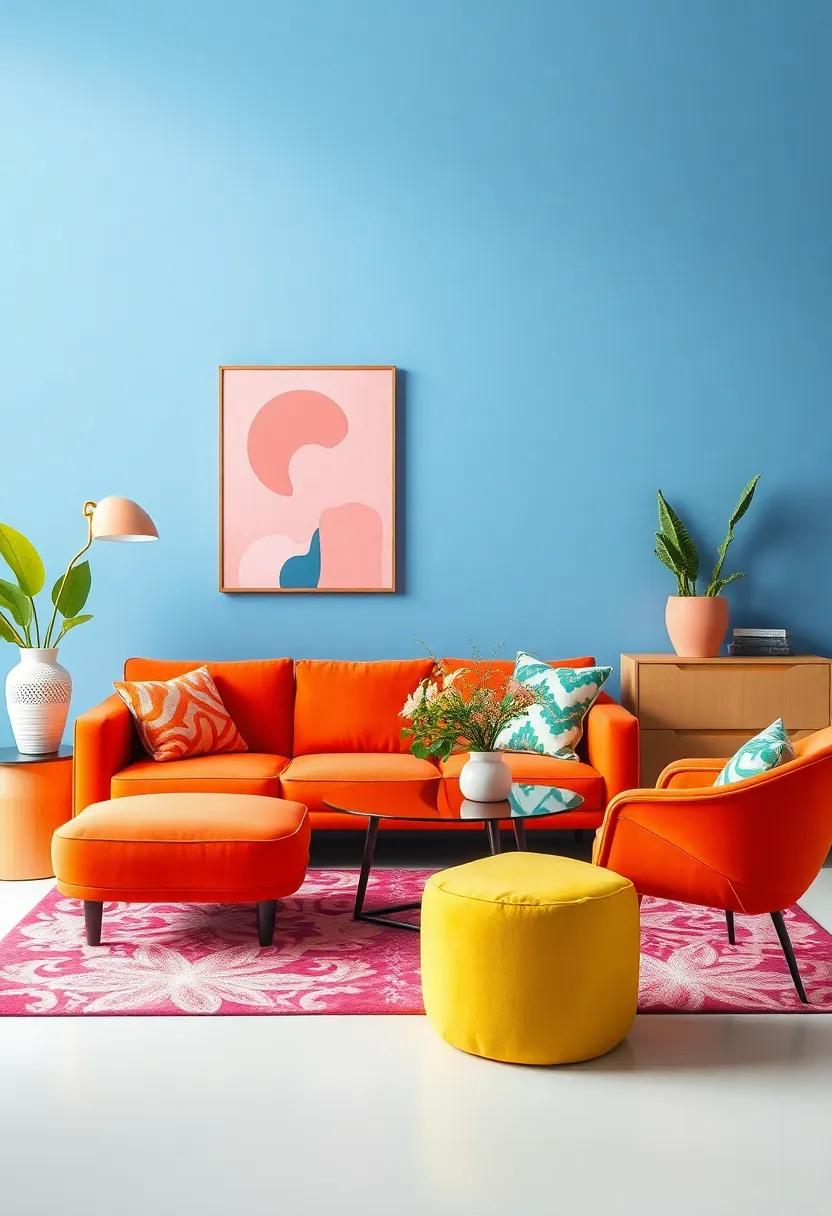
When exploring the realm of eclectic spaces, the amalgamation of diverse furniture choices stands as a testament to one’s creativity and personality.Gone are the days of adhering strictly to matching sets or minimalist aesthetics. Rather, bold statements are made through the careful selection of pieces that reflect individual narratives. By incorporating unexpected elements like a vintage trunk as a coffee table alongside a contemporary, sculptural sofa, homeowners can achieve a unique visual dialogue that captures the essence of their style. The key is to embrace contrasts and rely on pieces that harmonize well together despite their differences.
The allure of eclectic design is amplified by mixing materials, colors, and textures that speak to the soul. Consider introducing vibrant fabrics with rich patterns, alongside sleek metal or reclaimed wood. Here’s a small guide to inspire your choices:
| Material | Suggested Use |
|---|---|
| Velvet | Accent chairs or cushions |
| Reclaimed Wood | Coffee tables or shelving units |
| Metal accents | Light fixtures or frames |
| Patterned Fabrics | Upholstered furniture |
By daring to mix styles, tones, and eras, one can cultivate an environment overflowing with personality and vibrancy. The transformative power of eclectic design allows individuals to curate their surroundings, showcasing their journeys through carefully chosen artifacts that evoke memories and stories.
Lighting as Art: The Transformative Power of unique Fixtures
In the realm of design, lighting emerges not merely as a functional necessity but as a cornerstone of aesthetic expression. Unique fixtures, from vintage chandeliers adorned with crystals to bold, industrial-style pendants, have the ability to transform a mundane space into an artistic haven. Consider how a single statement piece can serve as a stunning focal point, drawing in the eye and igniting conversation.This duality—where practicality meets artistry—allows light to create mood, enhance colors, and define the atmosphere of a room, turning even the simplest of settings into an experiential delight.
when curated with intention, eclectic lighting plays a crucial role in embodying a maximalist flair. Imagine a well-styled corner featuring an assortment of lamps that tell a story of travel and culture. You can embrace diversity in your lighting choices with:
- Contrast: Mixing materials like brass and glass.
- Color: Choosing fixtures in vibrant hues to complement your decor.
- Design: Combining different styles, such as modern sconces paired with bohemian pendants.
| Fixture Type | Design Element | Impact on Space |
|---|---|---|
| Chandelier | Ornate | Elevates Elegance |
| Pendant Light | Sleek | Creates Focus |
| Floor Lamp | Architectural | Defines Zones |
Spatial Dynamics: Creating Flow in a Maximalist, Diverse Environment
In a world where design frequently enough leans towards minimalistic aesthetics, embracing a maximalist approach invites a celebration of diversity and vibrancy. To create flow in such richly layered environments, it’s essential to curate a harmonious blend of patterns, textures, and colors. This blend can be achieved through the strategic placement of furniture and decor, ensuring that each element complements rather than overwhelms. Consider incorporating diverse textures such as plush fabrics, sleek metals, and rustic woods, all while maintaining a balanced color palette that draws the eye across the space. Achieving a sense of movement can be further enhanced by utilizing key design principles like layering and contrast, which can help to guide the viewer’s experience.
Another vital aspect of spatial dynamics is the arrangement of furniture and objects to facilitate natural flow throughout the space. Implementing the following strategies can ensure that the environment feels cohesive and inviting:
- zone Distinction: create distinct areas for different activities,adorned with unique decor that reflects their purpose.
- Visual Pathways: Use rugs or lighting to delineate pathways, encouraging movement through the eclectic layers of design.
- Focal Points: Introduce standout pieces that draw attention and anchor the space, fostering a sense of cohesion.
A practical overview of prosperous maximalist arrangements can be seen in the table below:
| Design Element | Purpose | Exmaple |
|---|---|---|
| Bold Wall Art | Create a visual anchor | Oversized mural or eclectic gallery wall |
| Layered Textiles | add warmth and comfort | Mix of patterned cushions and throws |
| Mismatched Furniture | Introduce character | Vintage chair paired with modern sofa |
Sensory Experiences: Engaging All Senses in Eclectic Design
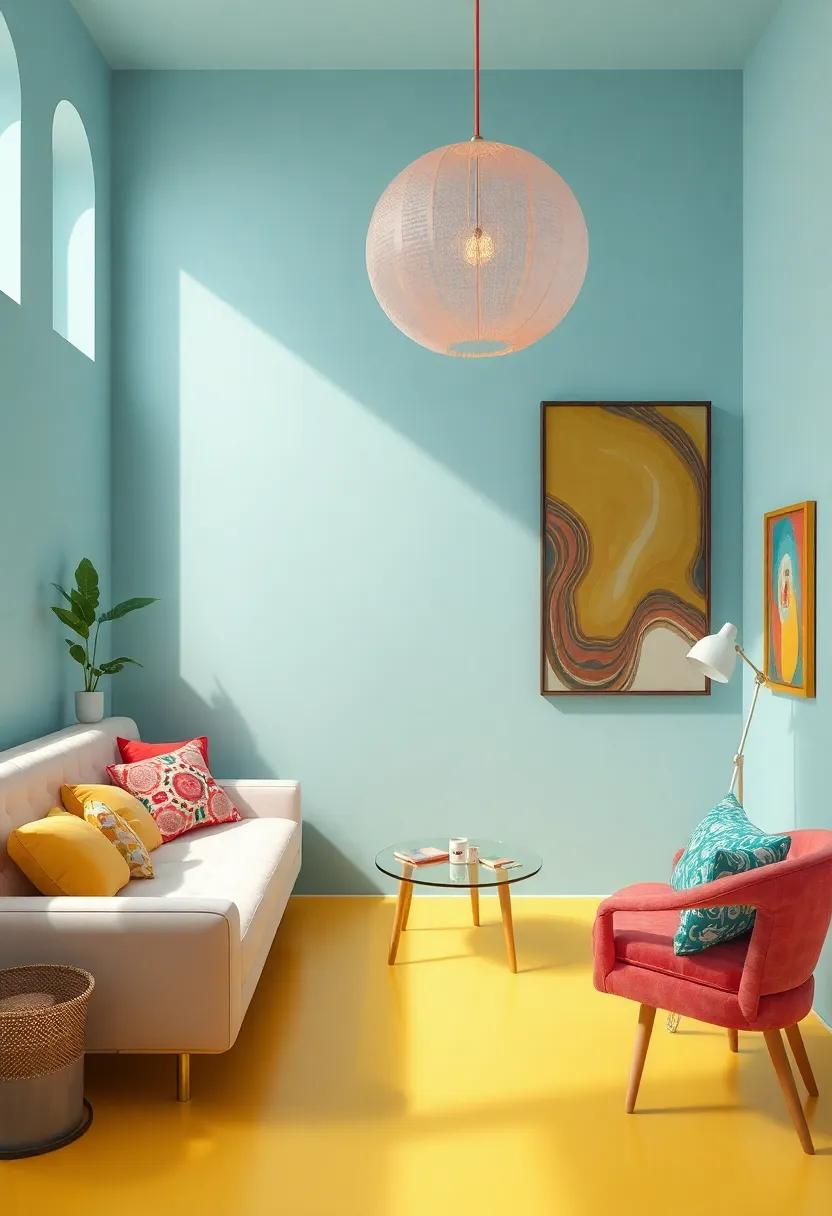
Eclectic design is a celebration of contrasts and harmonies,woven together to create spaces that resonate on multiple levels. By engaging all the senses, one can transform a space into a vibrant tapestry that captivates the mind and heart. Imagine walking into a room where the scent of fresh lavender mingles with the sound of crackling wood from a fireplace, while your eyes feast on an array of colors from mismatched vintage furniture.Adding elements such as textured fabrics, intricate patterns, and earthy tones not only enhances the aesthetic appeal but also invites tactile exploration.Consider incorporating the following sensory elements:
- Textures: Soft velvet cushions, chunky knitted throws, and smooth wooden surfaces.
- Colors: A bold palette that manages to feel cohesive, like jewel tones paired with earthy neutrals.
- Sounds: Ambient soundscapes or curated playlists that harmonize with the room’s vibe.
- Scents: Diffusers or candles that introduce calming or invigorating fragrances.
Consider incorporating a sensory table to visually display how elements can tastefully interact. A simple visualization can guide your journey through eclectic design, ensuring that every piece contributes to a rich sensory narrative:
| Sensory Element | Example | Experience |
|---|---|---|
| Texture | Knitted Throw | Warmth and Comfort |
| Color | deep Blue Wall | Calm and Serenity |
| Sound | Chirping Birds | Connection to Nature |
| Scent | Citrus Candle | Invigoration and Freshness |
Crafting Your Unique Voice: Individual Expression in Maximalist Design
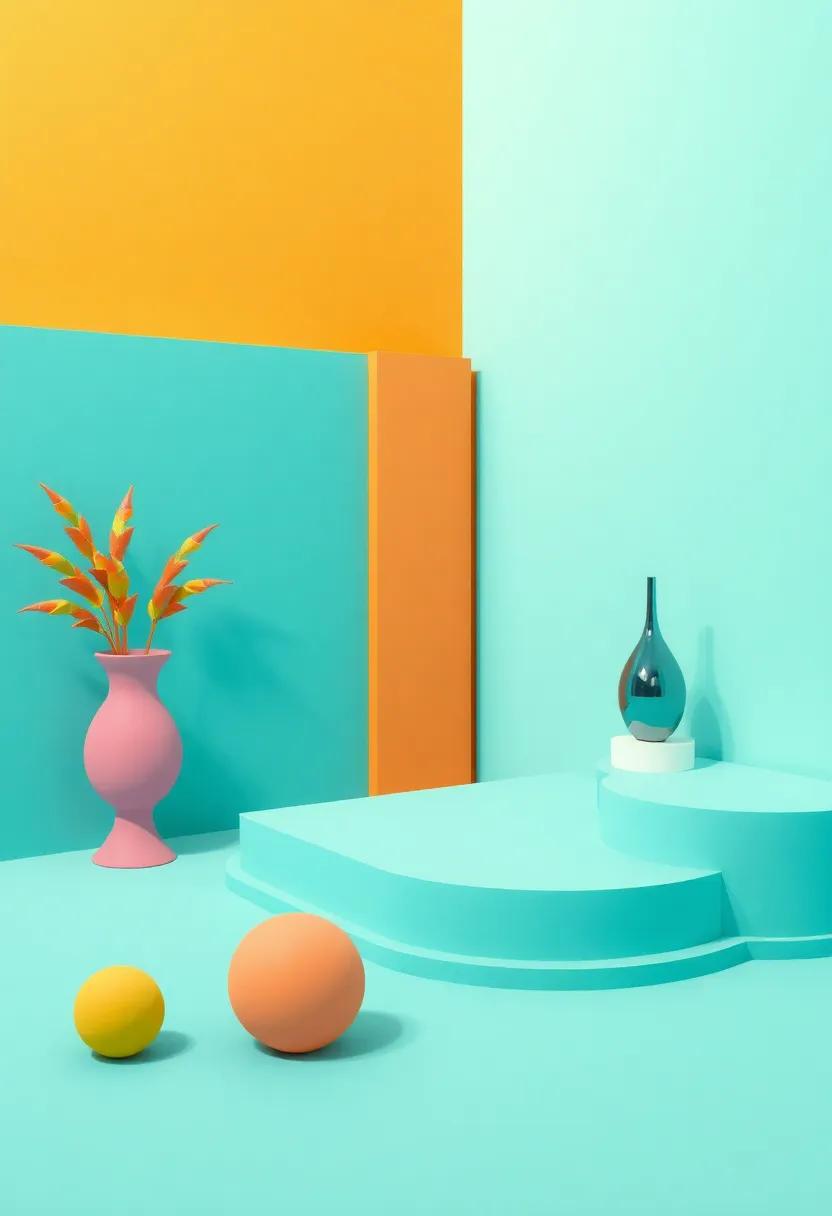
In the world of maximalist design, your individual expression is nothing short of a canvas waiting to be filled with vibrant strokes of your personality. Crafting a unique voice means weaving together various elements that echo your taste and experiences. By curating a blend of textures,colors,and patterns,you can transcend the conventional bounds of design. consider incorporating the following to showcase your personal flair:
- Bold Color Palettes: don’t shy away from clashing colors that resonate with your vibes.
- Layered Textiles: Use rich fabrics and materials that tell your story.
- Eclectic Artwork: Include pieces that reflect your life’s journey—every artwork carries a narrative.
- Unconventional Decor: Mix antique finds with modern accessories to create visual intrigue.
To express your artistry fully, it helps to merge diverse influences, allowing each piece to create a conversation within your space. Each article you choose to display should serve as a chapter in your design story. Balancing chaos with cohesiveness is pivotal; leverage this duality to spark joy and provoke thought in anyone who enters.Below is a simple comparison table to illustrate how various elements can come together in a maximalist setting:
| Element | Traditional Use | Maximalist Approach |
|---|---|---|
| Color | Neutral Tones | Vibrant, Clashing Colors |
| Furniture | Minimalist Pieces | Varied Styles, Mix and Match |
| Accessories | Single, Simple Decor | Layered Collections, More is More |
Juxtaposition of Eras: The Charm of Mixing Old and New Decor
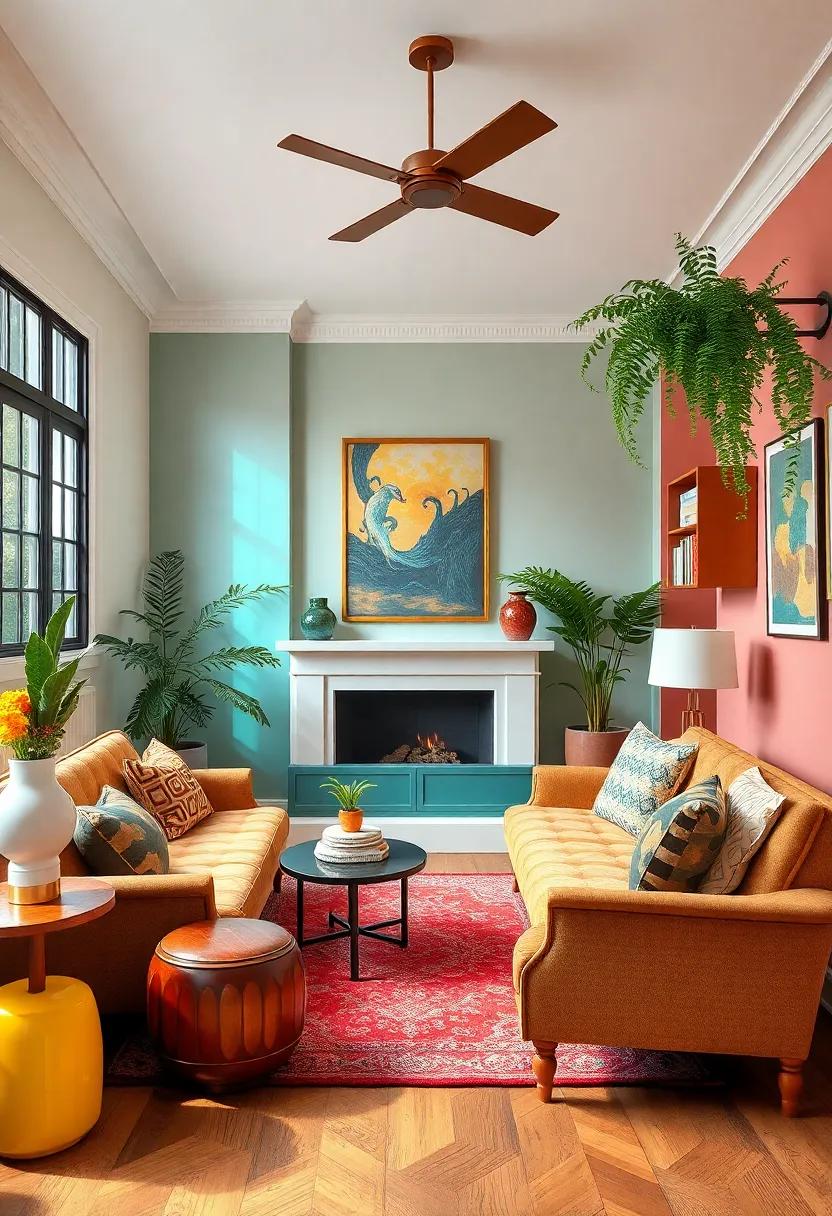
The allure of blending vintage elements with contemporary designs lays the groundwork for a visually stimulating environment that tells a story through its layers. Imagine a sleek modern sofa adorned with a collection of vibrant, hand-stitched pillows that echo the hues of a bygone era. This contrast not only highlights the beauty of each piece but also allows them to coexist harmoniously, creating a dialogue between the past and the present. By thoughtfully selecting accessories and fabrics that resonate with both styles, one can craft a living space that feels curated yet effortless.
To achieve this delightful contrast, consider incorporating key elements from both time periods:
- Furniture: Mix a minimalist coffee table with ornate baroque chairs.
- Artwork: Pair abstract art with classic oil paintings.
- Lighting: Use industrial pendant lights alongside vintage chandeliers.
This playful interaction invites exploration and sparks conversation, as guests are drawn to the intriguing combination of textures and aesthetics.The dynamic tension created by such a blend not only enhances the visual impact of each element but also allows for a personalized expression that is distinctly your own.
Celebrating Individuality: Designing Spaces that Reflect Personal Journeys
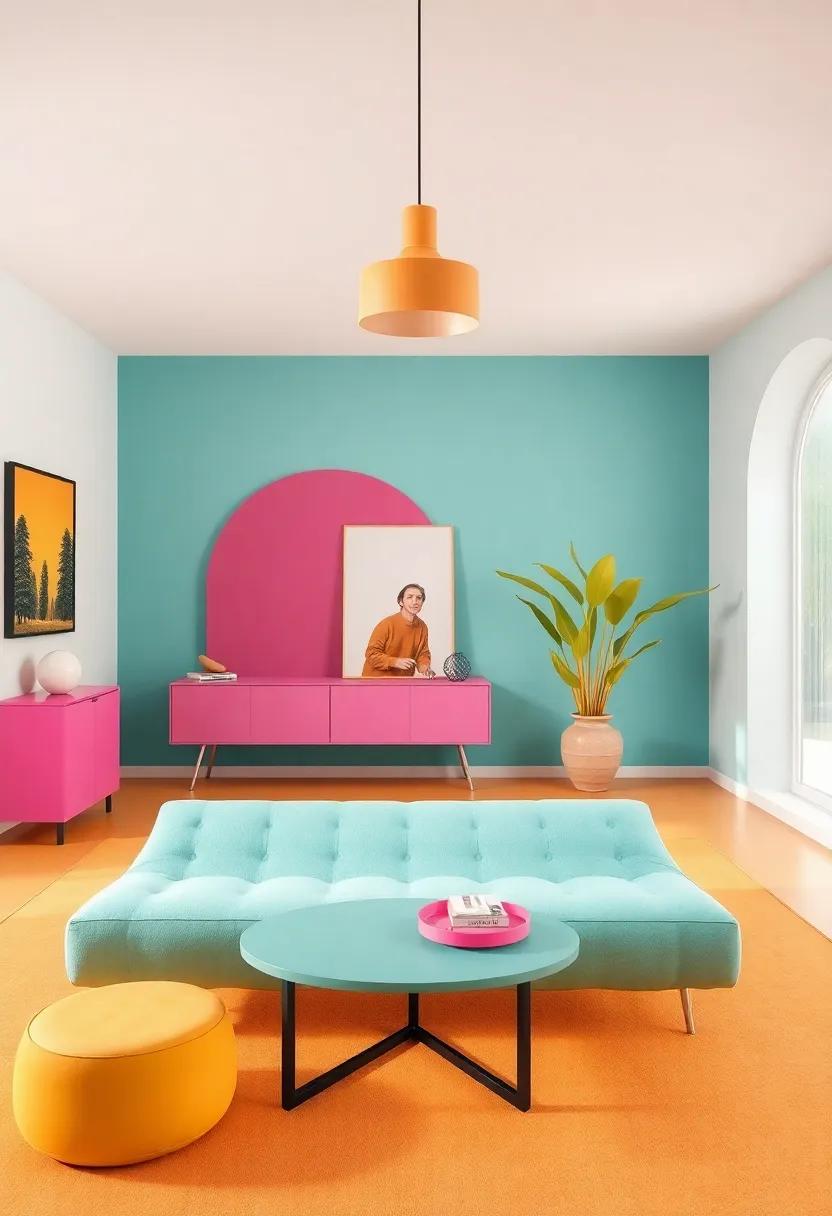
In a world where conformity frequently enough reigns, designing spaces that celebrate individuality becomes a liberating act of self-expression. Each room can tell a story, inviting us to share the threads of our personal journeys through carefully curated elements.From vibrant textiles to unique artworks, every piece can serve as a reflection of our experiences, values, and dreams. Consider incorporating:
- Vintage Treasures: Flea market finds or family heirlooms add character and history.
- Eclectic Color Palettes: Bold hues combined in unexpected ways can energize a space.
- Artistic Displays: An array of photos, sculptures, and handmade crafts can create a narrative of creativity.
To achieve a truly captivating environment, balance is key. The art of eclectic design lies in harmonizing diverse elements to create a cohesive yet dynamic atmosphere. A thoughtful arrangement can breathe life into contrasting styles. Consider employing the following strategies:
| element | Purpose |
|---|---|
| Layering Textures | Creates depth and interest through varied materials like wood, metal, and fabric. |
| Mixing Patterns | Adds vibrancy and excitement when combined thoughtfully. |
| Statement Pieces | Act as focal points, drawing the eye and sparking conversation. |
The Influence of Travel: Incorporating Souvenirs into Meaningful Decor
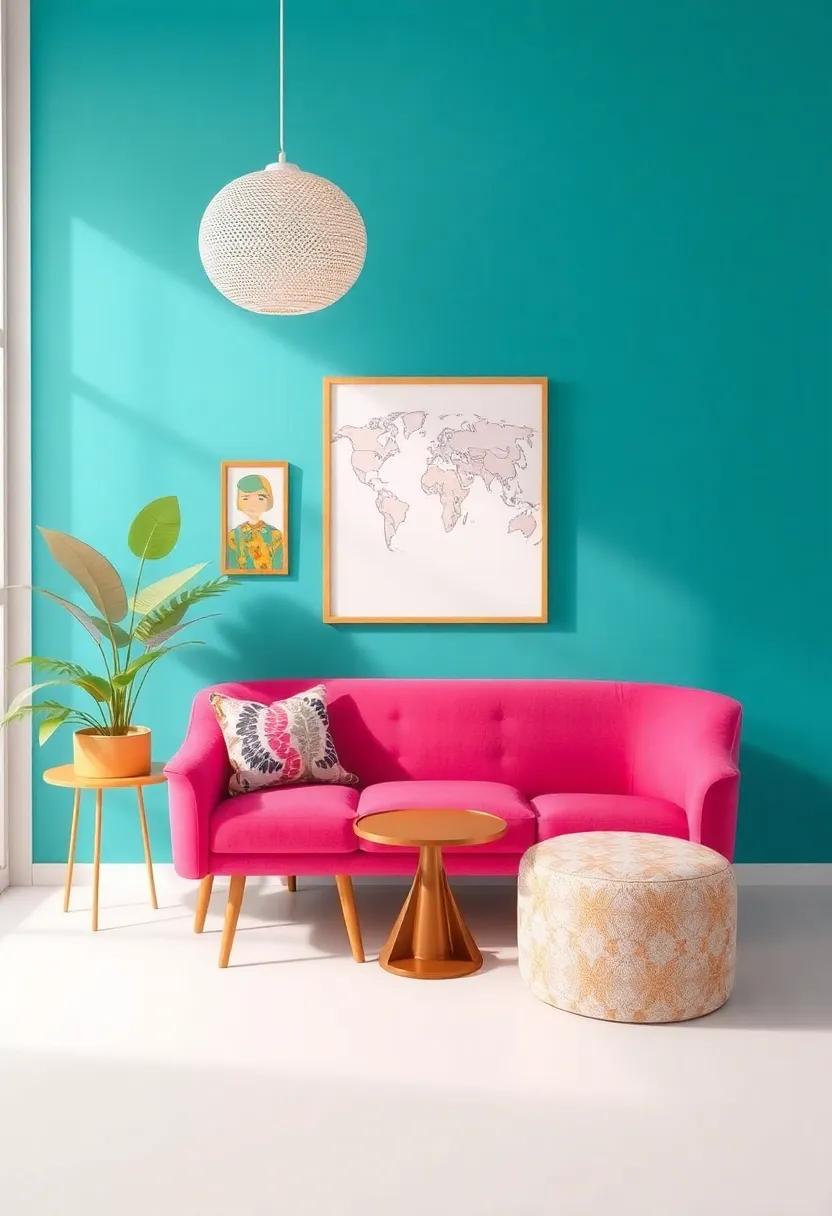
Travel often becomes a tapestry woven with memories, and souvenirs serve as the threads that bind those experiences into our daily lives. Each piece carries a story, from vibrant artisanal crafts to simple trinkets, celebrating the culture and essence of places visited. When incorporating these treasures into home decor, consider displaying them in ways that highlight their uniqueness and significance. Grouping items can create visually striking focal points, such as:
- Shadow boxes: A perfect way to encapsulate and showcase a selection of smaller items.
- Gallery walls: Create a vibrant patchwork of framed photographs, postcards, and unique artworks collected from around the globe.
- Accent shelves: Use floating shelves to display larger souvenirs alongside complementary items that tell a cohesive story.
To elevate your decor with an eclectic flair, consider how color, texture, and form interplay with each piece. Combining contrasting styles—like a rustic Peruvian textile with sleek Scandinavian ceramics—creates a dynamic visual experience. It is essential to maintain balance; here’s a simple guide to help you achieve harmony when mixing your souvenirs:
| Design Element | Suggestion |
|---|---|
| color | Choose three to four complementary colors found in your souvenirs. |
| Texture | Mix smooth, rough, and metallic surfaces to create visual interest. |
| Form | Pair geometric shapes with organic forms for an engaging contrast. |
In a world increasingly defined by uniformity, the art of eclectic design invites us to celebrate the rich tapestry of human expression. By embracing diversity through maximalist flair, we open doors to endless possibilities, allowing cultures, colors, and textures to coexist in vibrant harmony. This journey of self-revelation not only enriches our spaces but also enhances our understanding of the myriad influences that shape our collective identity. As you curate your own eclectic masterpiece, remember that each piece tells a story, each choice reflects a celebration of uniqueness. So, let your imagination soar and your creativity flourish—after all, in the realm of design, there are no limits, only gorgeous intersections waiting to be explored. Embrace the eclectic; make your space a canvas for the art of diversity.


